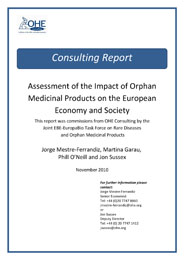Sign up to our newsletter Subscribe
Analysing Global Immunisation Expenditure

This report examines the effect of the European Union’s 1999 Regulation on Orphan Medicinal Products (OMPs) on the European economy and society. This study collected data on several indicators of activity, completed a confidential survey of companies developing OMP, concluded four case studies…
This report examines the effect of the European Union’s 1999 Regulation on Orphan Medicinal Products (OMPs) on the European economy and society. This study collected data on several indicators of activity, completed a confidential survey of companies developing OMP, concluded four case studies and undertook a literature review. The result is a rich tableau of data and information that describe the effects of the OMP Regulation in some detail. Findings include the following.
Assessment of the Impact of Orphan Medicinal Products on the European Economy and Society
Mestre-Ferrandiz, J., Garau, M., O'Neill, P. and Sussex, J.
(2010) Assessment of the Impact of Orphan Medicinal Products on the European Economy and Society. OHE Contract Research. Available from https://www.ohe.org/publications/assessment-impact-orphan-medicinal-products-european-economy-and-society/

